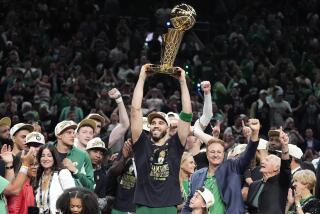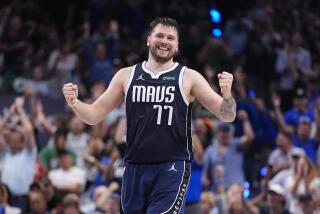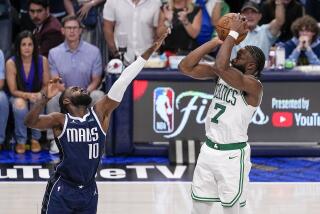Team Called Sunderella Recalled : A Decade Ago They Gave Celtics a Scare in NBA Final
- Share via
PHOENIX — Once upon a time, say about 10 years ago, there was a team called Sunderella.
Sunderella had always been ridiculed by the others, who laughed at their purple and tangerine uniforms and their expansion lineup consisting mostly of rookies and journeymen.
But lo and behold, Sunderella wound up at the ball and helped to create one of the most exciting NBA championship series in history.
“If there ever was a Cinderella team, it was the Phoenix Suns of 1975-76,” said John MacLeod, who remains as the Phoenix coach.
Two of their starters were rookies, the other three having been acquired through trades. Only one of them had been with Phoenix the previous season.
Alvan Adams was the Rookie of the Year, while the other rookie, Ricky Sobers, had a reputation for taking on all comers in court fistfights.
The lone returning starter, Curtis Perry, was thought of so lightly by Milwaukee that the Bucks left him unprotected in the expansion draft to New Orleans, then was immediately traded to Phoenix. The backup center, Dennis Awtrey, was best known for once having sucker-punched Kareem Abdul-Jabbar in the jaw.
Phoenix had gone just 42-40 during the regular season, then battled past Seattle in six games and defending champion Golden State in seven.
The Suns’ opponent in that 1976 championship series was the last team of the Boston Celtic dynasty, 1970s version. These were the Celtics of John Havlicek, Jo Jo White, Paul Silas and Dave Cowens.
The Celtics had gone 52-28 on the year, beating Buffalo and Cleveland in six games each in the playoffs.
At first, nobody gave Phoenix much of a chance against the Celtics. The Suns proved them right through the first two games in Boston.
The Suns shot just 38% in the first game to absorb a 98-87 loss and allowed Boston to score 20 of the first 22 points in the second contest to lose 105-90.
The frustration of the Suns was evident. In one of the most comical scenes of the series, Phoenix’s Paul Westphal resorted to an old playground trick in stopping White on a breakaway. He grabbed the waistband of White’s shorts and held on, letting go just before it was feared the shorts would rip under the strain.
But the complexion of the series changed in the next two games in Phoenix, partially aided by a newspaper column titled, “Can’t Anybody Here Call This Game?” It resurrected complaints by MacLeod that Boston was getting away with mugging.
“If you play for Boston, you can do things that other teams can’t do,” MacLeod was quoted as saying. “I’m not talking about the hand-checking. I’m talking about the bearhugs and forearm smashes.”
It’s not known if the article affected the officials that worked those two games, but it certainly affected the Phoenix fans, who played judge and jury as the officials practically came out of the locker room blowing the whistle.
A total of 65 fouls was called in a 105-98 Phoenix victory in Game 3, and 64 fouls were called in Game 4, a 109-107 Suns win.
Now it was Boston coach Tom Heinsohn’s turn to do the complaining.
“The referees were intimidated by the article in the paper,” Heinsohn recalls. “I later found out that the Suns had contacted the league office and virtually changed the hand-checking rule without letting me know.”
That set up Game 5, a triple-overtime thriller that some have called the greatest playoff game in the history of the NBA.
The Celtics exploded to a 22-point lead early in the second quarter, and the Suns never led until Curtis Perry made a free throw with 23 seconds remaining to put Phoenix up 95-94. Regulation ended with the score 95-95 after Havlicek made a free throw.
Actually, Phoenix might have won the game with one second left, as Silas signalled what would have been an excess timeout, a technical foul that could have put the Suns back in front. But referee Richie Powers, looking right at Silas, failed to blow the whistle.
That non-call has irritated Phoenix assistant coach Al Bianchi for the last 10 years.
“We got screwed,” Bianchi said recently. “I don’t think I’ve ever watched a tape (of that game). It’s that aggravating.”
The first overtime ended with the score 101-101, and the two teams battled point-for-point through the second overtime.
Perry had apparently given Phoenix the game with an 18-foot baseline jumper with five seconds left to make the score 110-109, but Havlicek came back with a 12-foot leaner off the glass with two seconds remaining to put Boston up 111-110.
Havlicek, who spent the entire playoffs playing on an injured left arch, recalled that he, the rest of the Celtics, and many fans thought the game was over at that point.
But there was still one second left on the clock.
“I remember being halfway undressed (in the locker room), then having to go back out,” he said.
After several minutes to clear the court of Boston fans holding an early victory celebration, Phoenix called an excess timeout, and White’s free throw gave Boston a 112-110 lead.
But Garfield Heard’s fallaway 18-foot jumper went through with no time left to send the game into a third overtime.
“I just watched the faces of the people in the Boston Garden,” recalled Heard. “When the ball went in the basket, there was just silence. That’s the biggest thrill I ever had in the Boston Garden -- just watching the people drop their mouths.”
Heinsohn went to his bench in the third overtime, and the Celtics got 6 points from Glenn McDonald and two clutch free throws by Jim Ard to put away a 128-126 victory.
If the game was physically draining for the players, it was emotionally draining for Heinsohn. He passed out right after the final horn, a victim of racing blood pressure.
With tipoff of Game 6 in Phoenix less than 36 hours away, it became a question of who would survive.
“That sixth game was really a matter of who could stand up,” Heinsohn recalled. “Both teams were dead tired.”
Perhaps bouyed by their victory in Game 5, the Celtics wrapped up the championship with an 87-80 victory.
For the Celtics, it was their 13th championship drape and the last of the Havlicek-Cowens-White era.
For the Suns, it was the end of the fairy tale. But as MacLeod recalls, “It was a great ride. That’s what playoff basketball is all about.”
More to Read
Go beyond the scoreboard
Get the latest on L.A.'s teams in the daily Sports Report newsletter.
You may occasionally receive promotional content from the Los Angeles Times.










